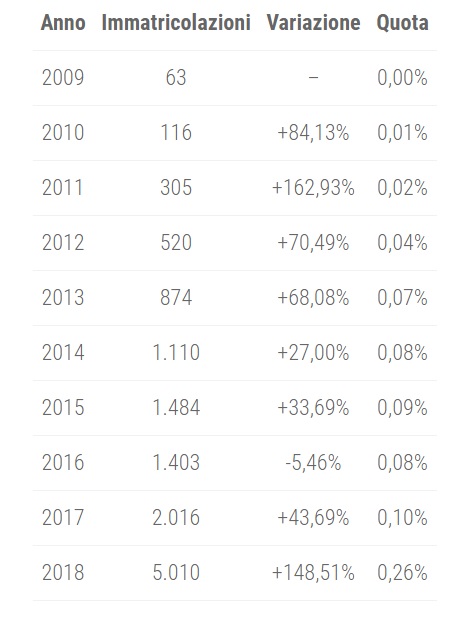On the wave of “psychological terrorism” that is overwhelming the diesel with related scandals, the automobile market has turned of arrogance towards the more or less complete electrification of the production lines. Obviously, this is true for some players in the sector, vice versa, some brands act in the opposite direction.
The market in Italy
In 2017, approximately 4827 electric cars were sold in Italy, an increase of 188% over the previous year when 2560 electric cars were registered. If we stopped at this figure, obviously we conclude that the market is growing and everything suggests a constant development over time. But that’s not exactly the case.
These instead are the data updated to 2018 in Italy.
Compared to the figures for Norway and Germany, for example (62,000 and 55,000), we are still a long way behind our European fellow citizens. However, from a careful analysis of the E-Mobility Report 2018, the market is still in absolute ferment. From a global analysis, however, in Italy circulate more or less 13,000 electric cars including pure electric and plug in.
Barriers to entry
On a numerical level, the automotive electric market in Italy is growing sharply in terms of volume of sales. However, recent market research has given us a chiaroscuro picture. The main barriers to the purchase of electric cars are mainly psychological, not to mention a delay in the development of the national infrastructure. The barriers can be summarised as follows:
- Cost barrier: the average cost of an electric car is between €20,000 and €40,000, and this is a first discriminating factor that “cuts” in a net way the target buyer.
- Infrastructure delay: in Italy there are only 4,207 recharging stations in about 2,108 locations (data updated to December 2017).
- Wrong information: consumers are often not aware of the time, place of charging and cost optimisation involved. This is the result of a widespread misinformation that circulates on the Net.
- Range anxiety: 1 in 2 consumers think they do not have enough autonomy to complete a totally electric journey without having to recharge their car again.
Strategies for the future
At an overall level, in the introduction we have specified that in general there is a more or less unambiguous behavior by the major brands that are implementing the electrification of existing car models or the creation of new models. More in detail, to overcome the problem of infrastructure, for example Tesla, has entered into a partnership with Enel to increase the installation of public charging stations. In the case of the EU Member States, France and Germany have instead entered into a partnership with China, the main holder of lithium, for the development of batteries, the main cost item for the construction of a 100% electric car.
In Italy, on the other hand, in order to push the growth of this niche market, the State is not only investing in the creation of a capillary infrastructure, but has also launched the controversial Eco bonus, that is, a system of financial benefits of a proportional type to be used for the purchase of an electric car with the simultaneous scrapping of a petrol or diesel car.
Overall, several steps forward have been taken, but the gap with European competitors is still marked.
Continue to follow our blog and follow us on our Facebook and Youtube page.
